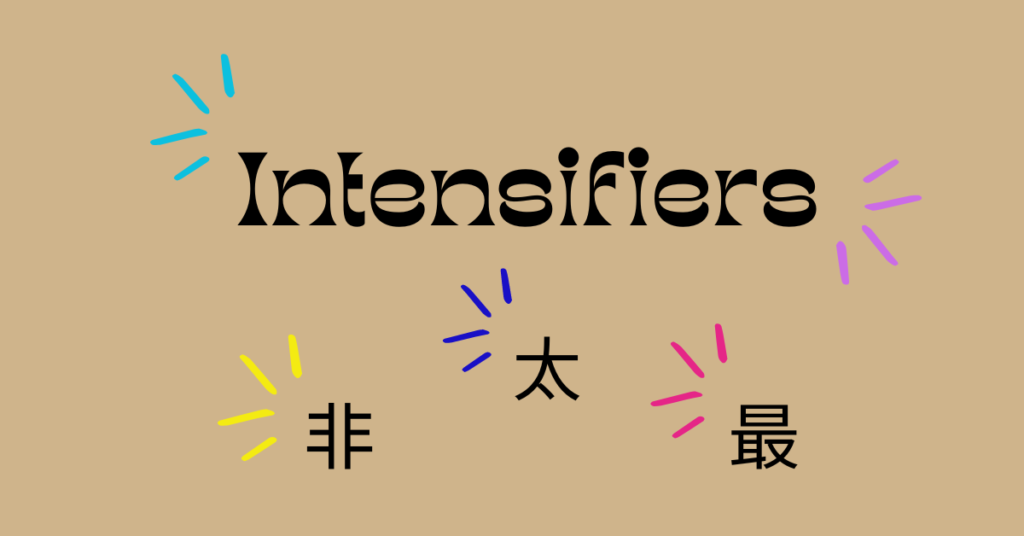
Here’s a detailed explanation of intensifiers in Chinese, along with examples:
Intensifiers
- 很 (hěn): 很 (hěn) is a common intensifier used in Chinese to indicate a high degree or intensity. It is used to emphasize the adjective or verb that follows it.
- Example: 这本书很好。(Zhè běn shū hěn hǎo.) – “This book is very good.”
- 真 (zhēn): 真 (zhēn) is another intensifier used to express a strong or genuine quality. It amplifies the adjective or verb it modifies.
- Example: 这个故事真好。(Zhège gùshi zhēn hǎo.) – “This story is really good.”
- 特别 (tè bié): 特别 (tè bié) means ‘especially’ or ‘particularly’ and is used to emphasize the adjective or verb it accompanies.
- Example: 这道菜特别好吃。(Zhè dào cài tè bié hǎo chī.) – “This dish is especially delicious.”
- 非常 (fēi cháng): 非常 (fēi cháng) means ‘very’ or ‘extremely’ and is used to intensify the adjective or verb it modifies.
- Example: 这个城市非常美丽。(Zhège chéngshì fēi cháng měilì.) – “This city is extremely beautiful.”
- 太 (tài): 太 (tài) means ‘too’ or ‘very’ and is used to express an extreme degree of the adjective or verb it precedes.
- Example: 这个节目太好了!(Zhège jiémù tài hǎo le!) – “This show is fantastic!”
- 最 (zuì): 最 (zuì) means ‘most’ or ‘best’ and is used to indicate the highest degree of the adjective or verb it modifies.
- Example: 这是我最喜欢的电影。(Zhè shì wǒ zuì xǐhuān de diànyǐng.) – “This is my favorite movie.”
These intensifiers are commonly used in Chinese to add emphasis, intensify the meaning, and convey a strong or extreme degree of the adjective or verb. They enhance the expressiveness and convey a sense of intensity or superiority.
Dialogue
Person A: 这件蛋糕看起来很好吃。
(This cake looks very delicious.)
(Zhè jiàn dàngāo kàn qǐlái hěn hào chī.)
Person B: 不仅好吃,而且真的很好。
(It’s not only delicious but also really good.)
(Bùjǐn hào chī, érqiě zhēn de hěn hǎo.)
Person A: 真的吗?我也想尝一尝。
(Really? I also want to have a taste.)
(Zhēn de ma? Wǒ yě xiǎng cháng yī cháng.)
Person B: 特别好!你一定会喜欢的。
(It’s especially good! You’ll definitely like it.)
(Tèbié hǎo! Nǐ yīdìng huì xǐhuān de.)
Person A: 非常感谢你的推荐!
(Thank you very much for your recommendation!)
(Fēicháng gǎnxiè nǐ de tuījiàn!)
In this dialogue, different intensifiers are used to emphasize the positive qualities of the cake. Person A initially comments that the cake looks good, and Person B responds by saying it’s not only good but also really good, using “不仅” (bùjǐn) and “而且” (érqiě) to intensify the statement. Person A expresses interest in trying it based on Person B’s enthusiastic description. Person B further emphasizes the goodness of the cake by using “特别” (tèbié) to highlight its exceptional quality. Person A appreciates the recommendation and expresses gratitude. The intensifiers used in the dialogue serve to strengthen the positive evaluations and convey a stronger sense of satisfaction.
Exercises
- Create your own sentences using intensifiers.